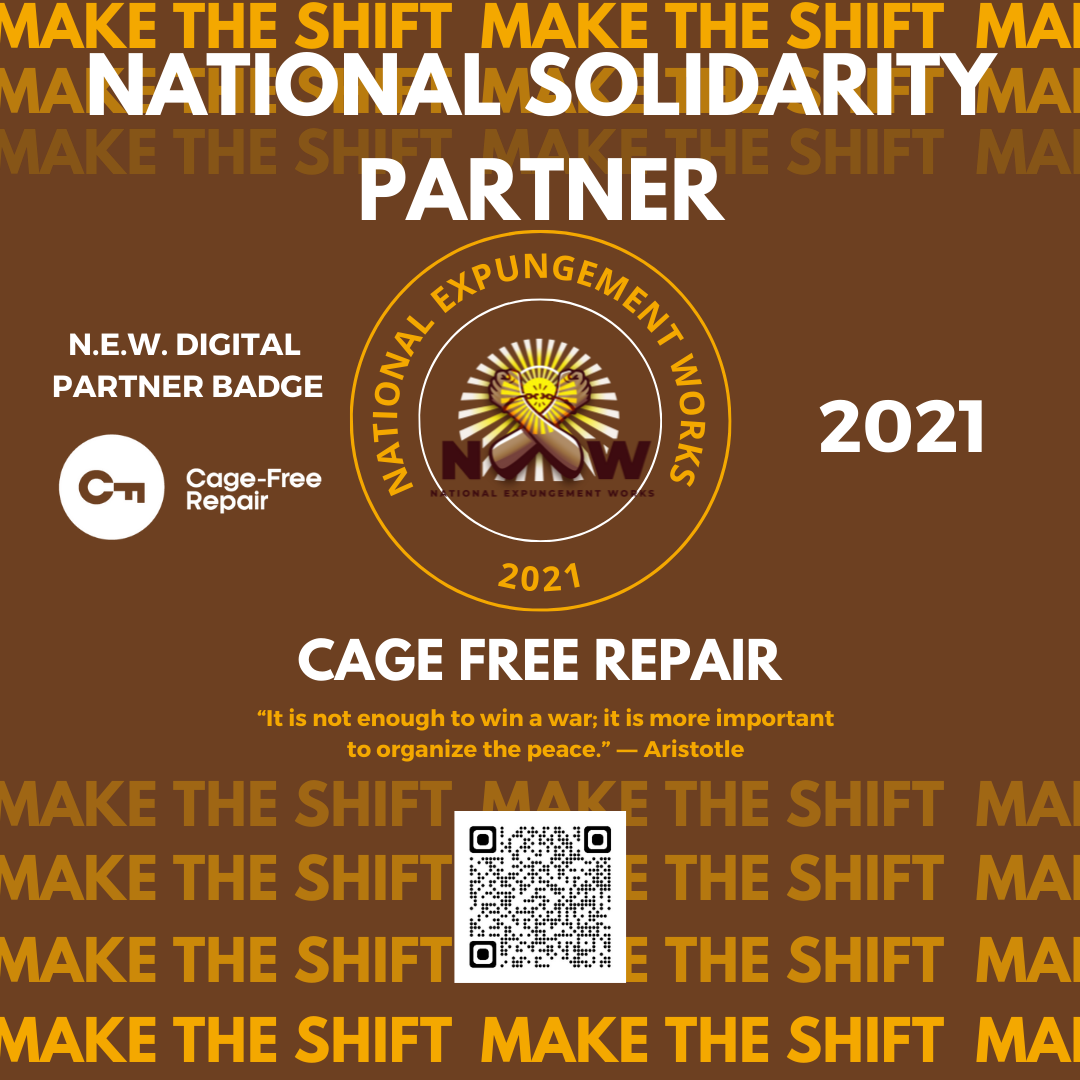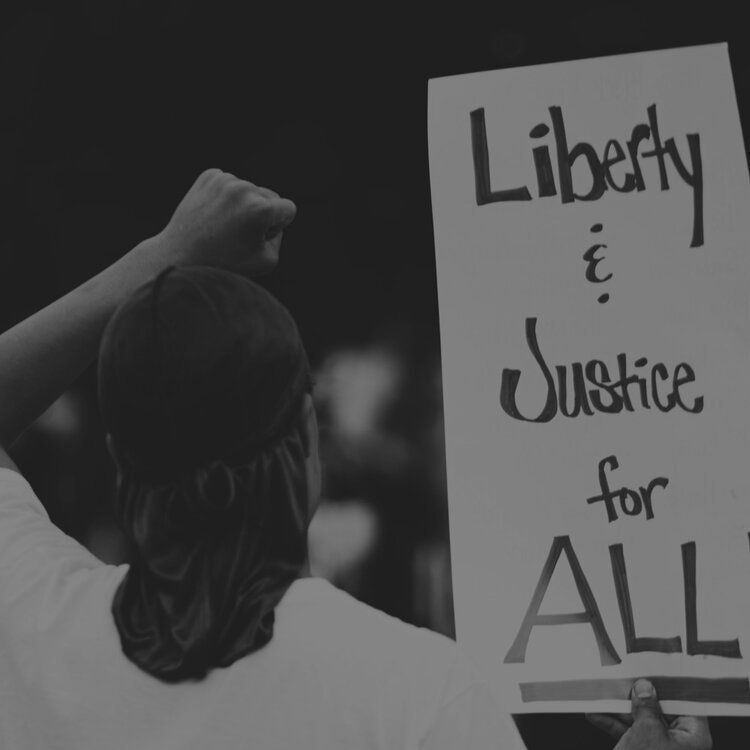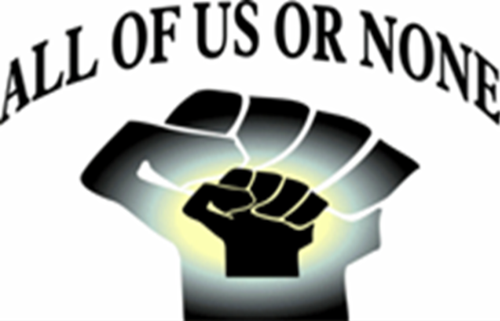ABOUT CAGE-FREE REPAIR
Cage-Free Repair is the 501(c)(3) non-profit arm of Cage-Free Cannabis, responsible for advocacy, organizing, event coordination, and the distribution of profits generated by Cage-Free Cannabis. Cage-Free Repair is a fiscally sponsored project of Social Good Fund.
NATIONAL EXPUNGEMENT WEEKCage-Free Repair helped launch the first-ever National Expungement Week in 2018 and continues to support National Expungement Works (the organization that coordinates the national week of action).
We stand with grassroots organizations that address issues like record clearance, re-entry assistance, youth development and empowerment, healing from trauma, community-based gang intervention, organizing against the systematic injustice of the Drug War, and creating cannabis-related businesses that hire, empower, and are owned by communities of color. |
A CAGE-FREE REPORT
Clarifying Collateral Consequences
Some organizers in the field of cannabis equity, justice, and repair thought we should join together on one week in September and help people restore their access to jobs, housing, education, and the right to vote!
The second annual National Expungement Week (NEW) featured more than 40 events in 30 cities across the US. These events will provide legal relief and wraparound services, such as employment workshops, health screenings, and voter registration, to some of the 77 million people in the U.S. with a criminal record. NEW is powered by a grassroots coalition of dozens of organizations, and it is nationally sponsored by Houseplant, Canopy Growth Corporation, and Caliva.The first-ever National Expungement Week (NEW) was a success. 18 events in 15 cities helped nearly 300 people begin the process of changing their records. In the places where expungement (or record change, or record sealing, or nullification) is possible, we expunged. The laws differ state by state, but what they share in common is that it’s too difficult to change your record.
The collateral consequences caused by these criminal records include barriers to employment, housing, voting rights, public benefits, and other vital services. So at NEW events, there were job opportunities, health screenings, free food, District Attorney debates, organizing meetings, and other resources that lift up the community and help people move forward with their lives.
To find out more, visit www.newxnow.org
If you're interested in getting involved, please write to us at [email protected]
The collateral consequences caused by these criminal records include barriers to employment, housing, voting rights, public benefits, and other vital services. So at NEW events, there were job opportunities, health screenings, free food, District Attorney debates, organizing meetings, and other resources that lift up the community and help people move forward with their lives.
To find out more, visit www.newxnow.org
If you're interested in getting involved, please write to us at [email protected]
|
EQUITY
Social Equity and Tax Revenue Allocation RecommendationsIn collaboration with community members, we have created a set of recommendations for cities, counties, and states to adopt as they implement cannabis regulations. These include "social equity programs," such as the one pioneered by Oakland, CA, as well as tax revenue allocations.
All recommendations proceed from the assumption that the cultivation, sale, and use of cannabis should be legal and regulated. Prior convictions for having participated in this industry should be immediately, and automatically, expunged and/or reclassified. |
Cannabis Equity Oversight Committee
Social Equity Licensing Program
Hiring, Job Training, & Community Outreach
Community Benefits Agreements
Tax Revenue Allocation
- Develop a permanent Cannabis Equity Oversight Committee to ensure and guide implementation of all the equity recommendations, monitor and track efforts, including tracking and analysis of enforcement (citations, arrests, business closures, etc.) and access to medicinal marijuana, to ensure that it is equitable. The Oversight Committee should report on findings no less than one time per calendar year.
Social Equity Licensing Program
- Institute a program akin to Oakland & Los Angeles' proposed program, which prioritize a one-for-one approach, in which applicants from communities disproportionately impacted by the Drug War receive licenses in a one-for-one ratio with all other applicants. (NOTE: Definition of what it means to be impacted needs to be easier to prove than it has been in Oakland.) An equity applicant would need to be defined by a combination of criteria, including geography, impacted person status, income level, and other factors, but not to be so stringent that hardly anyone qualifies.
- Provide technical, capacity building, and fiscal sustainability assistance for social equity applicants.
- Provide loan and banking assistance for social equity applicants.
- Open mentorship programs that can support the one-for-one approach for social equity applicants.
- Develop publicly-funded incubators and accelerators for cannabis entrepreneurs (this should include ancillary businesses as well as licensed businesses) from those communities.
- Prioritize licenses to cannabis businesses where at least 51% of their employees are formerly incarcerated or convicted.
Hiring, Job Training, & Community Outreach
- Open job training, workforce development programs, and workforce placement programs that prioritize those most impacted by the drug war (retail, manufacturing, ancillary, agricultural, administrative, etc.).
- Fund community outreach (performed by non-law enforcement agents) to existing, unlicensed operators in order to transition them into licensees.
- Fund community outreach to people impacted by prohibition, and host Reentry Fairs to educate them on the employment and entrepreneurship opportunities in the cannabis industry.
- Prioritize the employment of formerly incarcerated people in all cannabis-related community outreach, tracking, and employment training programs. (We recommend a hiring target of 50% for workers who have been impacted by the War on Drugs and/or would qualify as Social Equity License Applicants).
- Fund youth centers and after-school programming by community-based organizations as the primary means of youth access prevention.
- Exclude ALL drug offenses from background offense restrictions. Further, background checks should only apply to cannabis business applicants as opposed to employees of cannabis operations. Business applicants with recent convictions should also be afforded the option to petition for reconsideration to present “evidence of rehabilitation”, which the Cannabis Equity Oversight Committee should specifically define. (Further Clarification: The background checks only apply to owners. If someone was recently convicted of fraud or a violent offense, they may be excluded from taking ownership positions, but have an opportunity to petition for reconsideration. If someone was convicted and served time for any kind of drug offense, allow them to take any kind of business ownership position. Owners may conduct background checks on potential employees, but they are not required to do so.)
Community Benefits Agreements
- Require all licenses cannabis businesses to develop and execute a community benefits agreement (CBA). The CBA can take make forms, which can be fleshed out by the Equity Oversight Committee, some of which may include % profit giveback to community organizations, serving as an incubator to an equity applicant, community clean-ups.
Tax Revenue Allocation
- Allocate funds needed for regulating the cannabis industry, including law enforcement, in an amount not to exceed 20% of annual revenue. The remaining 80% should be broken out in the following way:
- No less than 50% of the annual revenue should be directed to youth access prevention, including direct funding to youth centers and after-school programming, public health funding, research and reporting funding, with no less than 75% of this funding to go to community based organizations.
- No less than 20% of annual revenue should go to an “Equity Fund,” established to support equity applicants.
- No less than 10% of annual revenue will be directed to local community colleges for job training, workforce development and workforce programs (retail, manufacturing, ancillary, agricultural, administrative), prioritizing enrollment by those most impacted by the drug war.
MODEL LEGISLATION SUMMARYThe best model cannabis legislation that we've seen in the U.S. was developed as a collaborative project led by the Minority Cannabis Business Association in cooperation with participants from Students for Sensible Drug Policy, Cannabis Cultural Association, Drug Policy Alliance, Greenlining Institute, Law Enforcement Action Partnership, National Cannabis Festival, Multidisciplinary Association for Psychedelic Studies, Families for Justice as Healing, Denver Relief Consulting, and THC Staffing Group. Legal support was provided by the Law Office of Richard M. Juang, Wyatt Legal Consulting, Rachelle Yeung, Esq., Shaleen Title, Esq., Shabnam Malek, Esq., Thomas Silverstein, Esq., and the law firm of Vicente Sederberg, LLC. The generous support of Kayvan Khalatbari made this project possible.
Click here for the summary of the bill. Click here for the full text of the bill. |
REPARATIVE JUSTICE
These are 3 Los Angeles-based groups whose work we love and support.
|
All of Us or None, LA/Long Beach Chapter
All of Us or None is a grassroots civil and human rights organization fighting for the rights of formerly- and currently-incarcerated people and our families. We are fighting against the discrimination that people face every day because of arrest or conviction history and we are building a powerful political movement to win full restoration of our human and civil rights. (learn more) |
|
Homies Unidos
Homies Unidos works to end violence and promote peace in our communities by empowering youth and their families to become advocates for social justice rather than agents of self-destruction. We offer an alternative vision to incarceration, deportation, and repressive and ineffective zero-tolerance “gang abatement” and “band-aid” social service strategies. Instead, Homies Unidos presents culturally competent access to alternative education, leadership development, self-esteem building, and health education programs tied to social justice advocacy programs that make a difference in the streets and homes of our community. (learn more) |
|
Welcome Home LA
Welcome Home LA hosts the Reentry Resource Fair, a monthly event for all formerly incarcerated individuals and their families returning to the community from juvenile halls, probation camps, jails, and prisons. We provide a supportive atmosphere where we celebrate, congratulate, and educate with FREE goods and services, such as Hygiene Kits, Clothing, HIV testing, Hot Catered Meals, Bus Passes, Cell Phones, and other FREE wrap around services that can assist with successful reentry. (learn more) |
Contact Us |
Subscribe |







